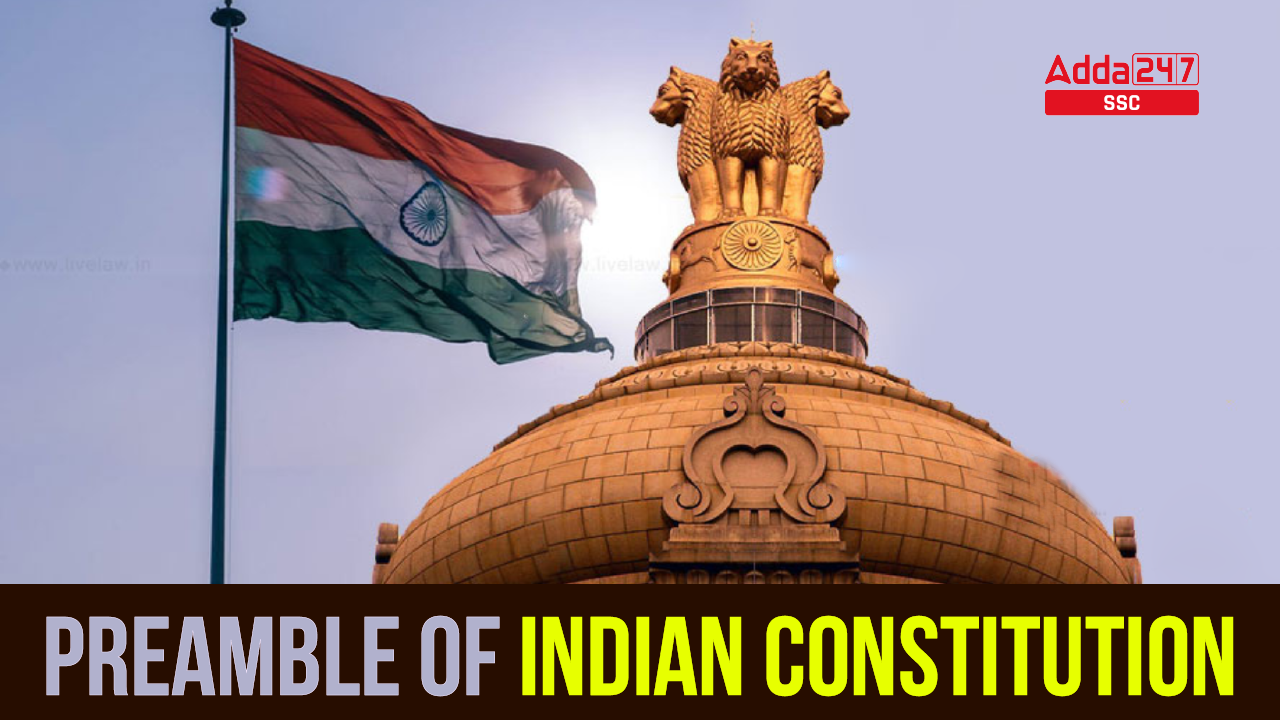The Preamble of the Indian Constitution
The Preamble of the Indian Constitution is an introductory part that outlines the fundamental principles and objectives of the Constitution. It was adopted on 26 November 1949 by the Constituent Assembly and came into effect on 26 January 1950, celebrated as the Republic Day of India.
The Preamble of India reads as follows:
“We, the people of India, having solemnly resolved to constitute India into a sovereign, socialist, secular, democratic republic and to secure to all its citizens:
Justice, social, economic, and political; Liberty of thought, expression, belief, faith, and worship; Equality of status and opportunity; And to promote among them all Fraternity assuring the dignity of the individual and the unity and integrity of the Nation;
In our Constituent Assembly, this twenty-sixth day of November 1949, do hereby adopt, enact, and give to ourselves this Constitution.”
The Preamble of the Indian Constitution: Highlights
The Preamble of the Indian Constitution begins with the words ‘We the Indian People’, emphasizing the collective power and sovereignty of the Indian people. The Preamble declares India to be a Sovereign, Socialist, Secular, and Democratic Republic which reflects the core values and aspirations of the country.
1. Sovereignty: Indian sovereignty means independent status as a state, free from external control or domination. It affirms the country’s right to make decisions and control its own affairs without interference from outside forces.
2. Socialist: The word “socialist” in the Preamble refers to the commitment to achieve social and economic equality through the principles of social justice. It reflects India’s goals of reducing inequality, promoting an equitable distribution of resources, and ensuring the welfare and well-being of its citizens.
3. Secular: The concept of secularism in the Preamble reflects India’s commitment to maintain a state that is fair and neutral towards religion. It upholds the principle of religious freedom and ensures that the state does not favour or discriminate against any particular religion. India recognizes and respects all religions equally and allows people to freely follow and practice their religion.
4. Democracy: The Preamble emphasizes the democratic character of India, affirming the sovereignty of the people and their right to participate in the government of the country. It emphasizes the principles of equality, liberty, and justice and emphasizes the importance of elected government for the people.
5. Republic: The word “republic” refers to the fact that India has an elected representative as head of state, as opposed to a hereditary monarch. It emphasizes the ideals of representative democracy and constitutionalism, in which the people own the means of government and exercise that power through their elected representatives.
What is the Preamble?
A preamble is an introductory statement in a document that seeks to explain the document’s philosophy and objectives. It presents the intention of the framers of the Constitution and the core values and principles of the nation. The preamble of India gives an idea of the following objects:
- Source of the Constitution: It is indicated by the Preamble that the source of authority of the Constitution lies with the people of India.
- Nature of Indian State: The preamble declares India to be a sovereign, socialist, secular, and democratic republic.
- Statement of its objectives: The objectives stated by the Preamble are to secure justice, liberty, and equality for all citizens and promote fraternity to maintain the unity and integrity of the nation.
- Date of its adoption: The date is mentioned in the preamble when it was adopted i.e. November 26, 1949.
The Preamble of the Indian Constitution Amendment
After the judgment of the Kesavanand Bharati case, it was accepted that the preamble is part of the Constitution. As a part of the Constitution, the preamble can be amended under Article 368 of the Constitution, but the basic structure of the preamble cannot be amended.
As of now, the preamble is only amended once through the 42nd Amendment Act, of 1976.
- The terms ‘Socialist’, ‘Secular’, and ‘Integrity’ were added to the preamble through the 42nd Amendment Act, 1976.
- ‘Socialist’ and ‘Secular’ were added between ‘Sovereign’ and ‘Democratic’.
- ‘Unity of the Nation’ was changed to ‘Unity and Integrity of the Nation’.



 How can I get selected for Delhi Police ...
How can I get selected for Delhi Police ...
 SSC CHSL Vs. SSC CGL – What Changes in S...
SSC CHSL Vs. SSC CGL – What Changes in S...
 Importance of Solving Previous Year Pape...
Importance of Solving Previous Year Pape...









